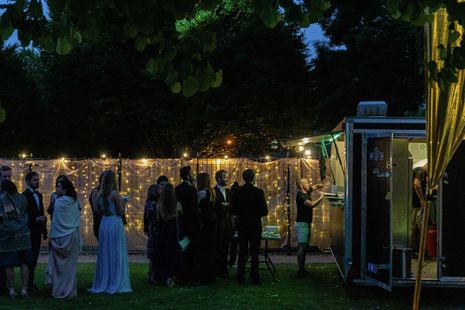May Week isn’t going anywhere
Greg Quinn argues that the apparent instability of May Balls is nothing new

The May Ball is not a new concept. Little in Cambridge is – after all, May Week as we know it has been held in the middle of June since 1882. However, with May Week fast approaching, you wouldn’t be unique in feeling slightly destabilised recently. Despite their place in Cambridge’s May Week as the several hundred pound highlight, May Balls appear increasingly volatile, emerging around November only to crash in cancellation by April. This begs the question: how can seemingly immovable Cambridge traditions like the May Ball be collapsing, and has this always happened?
Taking a look at May Balls as a tradition can help to reassure that change has happened before, yet the balls are still here. Recent cancellations and last-minute changes to May Balls may seem to signify a new way of things in an increasingly bizarre modernity. Certainly, the history of the balls is not without its controversies, and catalogues a history of Cambridge social change through one of its most opulent traditions.
“How can Cambridge traditions like the May Ball be collapsing?”
With its origins in the 1830s, the annual May Ball tradition, which was going strong as recently as the 2000s for smaller “old” colleges like Clare, seems to be vanishing. Though wealthy colleges like John’s still mostly appear to be standing up to the challenge of annual May Balls, by the 1890s many colleges had slipped into irregular and increasingly implausible May Balls. It’s worth noting that May Balls have always been at a locus of Cambridge student life, and a significant cultural indicator in the university. For instance, in the 1960s and 70s, when social change led students to advocate for looser rules at these stiff functions. May Balls moved from small orchestras to rock bands; with the King’s ‘affair’ rumoured to have originated in the 70s when The Stranglers caused a sea of gatecrashing at the King’s ball leading to police banning the event for ten years. King’s responded to the ban with its June event we know today, offering something of a contradiction to the May Ball format dating back almost fifty years. This story offers some reassurance, revealing the May Ball’s legacy of misfires and sudden changes – mismanagement and incidents pepper the history of the balls as they fight to adapt to changing tastes.
“May Balls have always been a significant cultural indicator”
Another disruption in the May Ball’s journey was the shift away from all-male colleges, which led to a reduction in ticket sales as students began going together rather than with guests from outside the university, sparking a run of ball cancellations. By the 90s annual May Balls weren’t viable for many colleges, still facing the issues of student-led committees and an over-saturated market. These economic reasons coincided with more students wanting relaxed, much cheaper, May Events. Indeed, one peculiar comment in The Independent from the president of the cancelled Emma May Ball in 1993, Jason Noble, notes that “[t]he reason more May Balls than ever went down this year is that, before, when you got a degree from Cambridge you were almost guaranteed a job. Now people have to justify their spending because they don’t have that security”. It appears reasons for May Balls flopping 30 years ago were equally as elusive and nonsensical as they are today, but this comment does illustrate a definite changing atmosphere around how Cambridge students felt in the tradition. In an increasingly accessible Cambridge, the balls began to appear more alien, no longer resolutely an event most, if any, Cambridge students felt comfortable in.
All this to say, whilst it may appear that May Balls are crashing down like much of the world seems to be at the moment, the balls themselves have always been centres of change. They exemplify the role tradition holds as trying to stay fixed in changing times, from the advent of rock to all-male colleges being abolished, the balls have seen a lot. Even now, their place in the midst of pro-Palestine student activists calling for divestment threatens controversy and protest, especially at John’s and Trinity. May Balls will perhaps always be peculiar and will undoubtedly change, as we may see in the near future, with smaller May events, less frequent balls, and an invariable centralisation around wealthier colleges. Taking their history into account may help ease some of the disappointment anyone might rightly feel at getting that email from the committee saying that the May Ball has unfortunately been cancelled. The only consolation a history of May Balls offers is this: that in finding a new May Ball ticket at short notice you have been inducted into as common a tradition, in recent times, as the balls themselves.
 News / Colleges charge different rents for the same Castle Street accommodation2 March 2026
News / Colleges charge different rents for the same Castle Street accommodation2 March 2026 News / News in Brief: waterworks, wine woes, and workplace wins 1 March 2026
News / News in Brief: waterworks, wine woes, and workplace wins 1 March 2026 News / Climate activists protest for ‘ethical careers policy’1 March 2026
News / Climate activists protest for ‘ethical careers policy’1 March 2026 News / Angela Merkel among Cambridge honorary degree nominees27 February 2026
News / Angela Merkel among Cambridge honorary degree nominees27 February 2026 News / Private school teacher who lied about Cambridge degree barred from teaching27 February 2026
News / Private school teacher who lied about Cambridge degree barred from teaching27 February 2026









